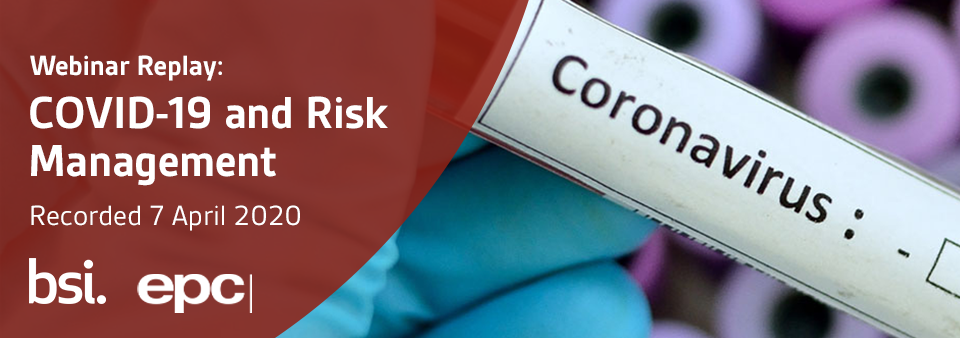Webinar Replay
COVID-19 and Risk Management
Recorded 7 April 2020 (09:00 - 10:30 BST)
The ability to manage risk effectively in the coming months and years is going to be critical to the survival and recovery of organizations.
Using the language of former US politician Donald Rumsfeld, a pandemic is a “Known Unknown” risk. It is a risk we are aware of but one that has a trajectory that is unknown. These hallmarks are often used to describe emerging risks which unlike “Black Swan” risks are known to some degree but are difficult to quantify. They can have far reaching impacts on business and society – and may start slowly and then rapidly progress.
At the moment much is still uncertain but this fog will clear as time passes and we'll each need to look to our priorities and the critical activities needed to get back to business. Whatever the business, it’s unlikely that it will be “business as usual”. The ISO 31000 Risk Management standard provides an adaptive framework that can be tailored to the needs of your organization and your customers. Other standards being provided for free by BSI offer additional guidance that can also help, but the first step in managing your recovery is identifying and understanding what risks are most likely to affect you and your organization in the context of any re-purposing the organization undertakes.
A structured approach to how the coronavirus is affecting your organization and careful consideration of the critical decisions will have a big influence on how quickly you recover. The importance of how organizations are managing their risk has grown tremendously over the past few years with much of the focus on Cyber and Climate Risk. The events of the past few months will only increase the pressure as hard lessons are learned by government and organizations.
Emerging risks are especially important in the context of strategic planning which typically has a long term horizon, and where assumptions about the future are critical and more likely to become invalid during the planning horizon. We will look back on our experience post COVID-19 at a world that has changed. Our shared experience of the effects of COVID-19 is a game-changer for many and will change how most organizations approach risk management.
The international standard for Risk Management, ISO 31000, provides the structure needed to help organize and mitigate risk in a complex world. How can business and society cope with the dynamics of a risk that doesn’t play by the risk rules?
Meet our speakers:
Julia Graham, Technical Director, AIRMIC
Julia is the Deputy CEO and Technical Director of Airmic, the UK association of insurance and risk professionals. She has a background in international insurance, enterprise risk management, compliance and business continuity and crisis management with four decades of experience in a global insurance company and a global law firm.
Julia has written many articles published in professional journals and the press and is a regular public commentator on all things risk management. Julia is a former chair of FERMA, the European association for risk management professionals and is currently a board member of IFRIMA, the International Federation of Risk and Insurance Management Associations.
Russell Price, Chairman, Continuity Forum
Russell has been at the forefront of development across the Risk, Business Continuity and Resilience fields for over 20 years and continues to work to build industry thinking and professional practice. He is Chair of the Risk Management Committee (RM/1) for the British Standards Institute, the UK’s National Standards body, and a member of the Continuity and Resilience (CAR/1) and the Societal Security Management (SSM/1) Committees.
Russell is also a Subject Matter Expert for the International Standards Organisations’ technical committees covering Risk Management (TC 262) and Security and Resilience (TC292) as well as ISO/IEC JTC 1/SC 27 that is responsible for the protection of information and ICT.
Deborah Higgins, Head of Cabinet Office Emergency Planning College (EPC)
 Deborah is an experienced emergency management and business continuity specialist. Having designed large-scale crisis management training and exercises, she has also led on the design and development of British Standards and qualifications.
Deborah is an experienced emergency management and business continuity specialist. Having designed large-scale crisis management training and exercises, she has also led on the design and development of British Standards and qualifications.
As Head of the Cabinet Office Emergency Planning College, Deborah is responsible for directing all EPC activities and for managing the relationship with the Cabinet Office, Serco and wider stakeholder groups. With vast practical experience in emergency management and business continuity management internationally, Deborah has designed and coordinated large-scale multi-agency incident and crisis management training and exercises at operational, tactical and strategic level.
Please note: The British Standards Institution (BSI) is the National Standards Body (NSB) for the UK. This webinar was organized as a collaboration between BSI (The National Standards Body), BSI Group and the Emergency Planning College (Cabinet Office), in accordance with competition law. By registering for this webinar replay, you are providing consent for BSI’s NSB and non-NSB businesses alongside the Cabinet Office and Emergency Planning College to contact you on matters relating to this webinar.


